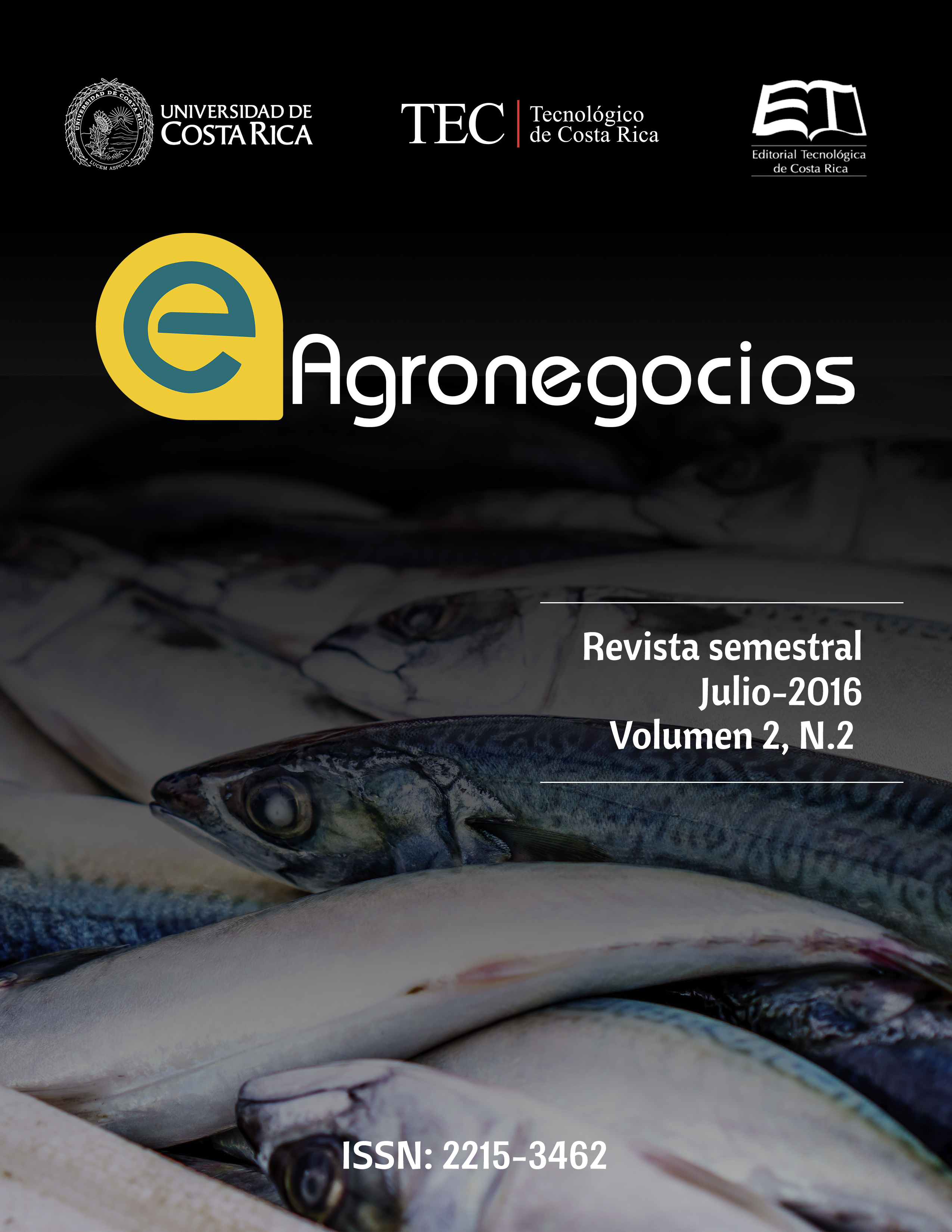Preorganizational diagnostic of fish community
Main Article Content
Abstract
The Costa Rican Institute of Fishing and Aquaculture (INCOPESCA), through the Ministry of Agriculture and Livestock (MAG), asked the School of Economics and Agribusiness at the University of Costa Rica (EEAA), a technical approach in analyzing a diagnosis pre organizational for the fishing community. This institutional initiative comes as a concern by the INCOPESCA in order to improve the socioeconomic situation of the inhabitants of that community.
The community studied has a population of 62 inhabitants between 0 and 74 years of age, of whom 49% are men and the remaining 51% women. The primary activity is subsistence fishing and shellfish extraction, whose products are marketed in the Central Market of Puntarenas.
This fishing property is characterized by a marked division that constantly undermines community work together in integrated projects that benefit the people. Given these situations, methodologically pre organizational analysis focused on the socio-organizational, economic, productive and environmental dimensions. The development of this process was guided by a team of EEAA and seniors Greece Campus of the University of Costa Rica.
It was concluded that there is institutional capacity to support the fishing community, however you need to work on a comprehensive training program in areas of human, organizational and business development in the short term, people in the community to adopt an organizational figure enabling them to improve their socio-economic and productive conditions.
Article Details

This work is licensed under a Creative Commons Attribution-NonCommercial 4.0 International License.
Las personas autoras conservan los derechos de autor/a y ceden a la revista el derecho de la primera publicación y que pueda editarlo, reproducirlo, distribuirlo, exhibirlo y comunicarlo en el país y en el extranjero mediante medios impresos y electrónicos. Asimismo, las personas autoras asumen el compromiso sobre cualquier litigio o reclamación relacionada con derechos de propiedad intelectual, exonerando de responsabilidad a la Editorial Tecnológica de Costa Rica. Además, se establece que los autores pueden realizar otros acuerdos contractuales independientes y adicionales para la distribución no exclusiva de la versión del artículo publicado en esta revista (p. ej., incluirlo en un repositorio institucional o publicarlo en un libro) siempre que indiquen claramente que el trabajo se publicó por primera vez en esta revista.
References
Balarezo, S. (1994). Guía Metodológica para incorporar la dimensión de género en el ciclo de proyectos forestales participativos. Quito, Ecuador: FAO.
Banco Mundial. (2008). Agricultura para el desarrollo. Bogotá: Mundi-Prensa y Mayol Ediciones, S.A.
CEPAL, FAO, IICA. (2015). Perspectivas de la agricultura y del desarrollo rural en las Américas: una mirada hacia América Latina y el Caribe 2015-2016. San José: Editorial IICA.
Estudiantes, Curso de Economía y Organización Agroempresarial (2015). Análisis Estadístico y Organizacional del caso de la Islita en Puntarenas. Grecia, Costa Rica.
Food and Agriculture Organization "FAO" y Instituto Costarricense de Pesca y Acuicultura "INCOPESCA" (2015). Directrices Voluntarias para lograr la Sostenibilidad de la Pesca en Pequeña Escala, en el Contexto de la Seguridad Alimentaria y la Erradicación de la Pobreza. Puntarenas, Costa Rica.
FAO. (2013). Agroindustrias para el desarrollo. Roma.
Pakeltienė, R. (2015). “RURAL WEB” METHOD FOR REVEALING A POTENTIAL OF RURAL. Management Theory and Studies for Rural Business and Infrastructure Development, 37(4), 562–575.
Salazar, A. (2013). Situación actual de la pesca artesanal en Costa Rica. Anuario de
Estudios Centroamericanos, Universidad de Costa Rica, 39: 311-342, 2013
ISSN: 0377-7316
Source, A. d. (1969). Como promover la capacidad del pueblo. El Ciervo, 179, 8-9.

